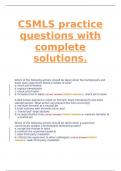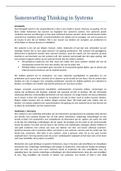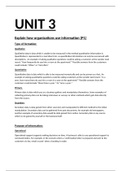W3: Civil and Political Rights
International human rights, three elements:
- Object: the right to what?
- Subject: the right to whom (who is enjoying this right)?
- Addressee: duty bearer (who is responsible to implement this right? Mostly: states)
These three = Normative content
There is a difference with enforcement!
Civil and political rights
Classic freedom rights; state abstention (state have to give you your freedom, has to give
you space)
Treaty: Covenant on Civil and Political Rights
Art 2 ICCPR
- Subjects (in art 2: individuals within territory and under jurisdiction).
- In GC31: individuals, but collective dimension+ anyone within the power or effective
control of Sate Party (extra-territorial dimension – Lopes Burgos case
Loped Burgos
- As a state, you have to investigate.
- States party’s jurisdiction
- Non justification (non-derogation)
- Positive obligations
State party obligations
- implementation at national level- immediate obligations
- positive and negative obligations
- effective remedy and preparation
- ICCPR Treaty: it has indirect horizontal effect.
Human rights Committee
- State reports
- Individual complaints
- General comments
Individual complaints
- State must have ratified treaty competence of treaty body
- State must have ratified treaty
- Exhaust local remedies
- Importance of caselaw!
Interpretation of Treaties: art 31-33 VCLT
- First: Ordinary meaning
, - If that doesn’t work: look at purpose and object
- Subsequent agreements and practice
- Preparatory works
Human right Treaties
- Dynamic instruments
- Limitations+ margin of discretion
- Core periphery
Methods of interpretation
- Art 31 vclt: objective method- literal or teleological method- dynamic or systemic
interpretation
- Art 31 vclt: subjective method
Procedure
- Admissibility (formal requirements, see all the requirements on the PPT)
- Merits (content of the case)
- Urgent/interim measures to prevent irreparable harm
Admissibility
- Personally and directly affected
- Ratione materiae
- Sufficiently substainaited
- Ratione temporis
- Exhaustion of local remedies
- Examination under human rights procedure
- Reservation by state
Merits
= scope -> applicability
- Non-derogation -> art 4(2) (derogation is always when there is an emergency and
temporary)
Not to be confused with jus cogens
All jus cogens norms are non-derogable, but not all the non-derogable rights are jus
cogens
- Limitations
by law
Legitimate aim
Necessarily
Decision and follow up (GC 33)
- Decision is final- no appeal
- Views binding or not?
- Art 2 ICCPR effective remedy
International human rights, three elements:
- Object: the right to what?
- Subject: the right to whom (who is enjoying this right)?
- Addressee: duty bearer (who is responsible to implement this right? Mostly: states)
These three = Normative content
There is a difference with enforcement!
Civil and political rights
Classic freedom rights; state abstention (state have to give you your freedom, has to give
you space)
Treaty: Covenant on Civil and Political Rights
Art 2 ICCPR
- Subjects (in art 2: individuals within territory and under jurisdiction).
- In GC31: individuals, but collective dimension+ anyone within the power or effective
control of Sate Party (extra-territorial dimension – Lopes Burgos case
Loped Burgos
- As a state, you have to investigate.
- States party’s jurisdiction
- Non justification (non-derogation)
- Positive obligations
State party obligations
- implementation at national level- immediate obligations
- positive and negative obligations
- effective remedy and preparation
- ICCPR Treaty: it has indirect horizontal effect.
Human rights Committee
- State reports
- Individual complaints
- General comments
Individual complaints
- State must have ratified treaty competence of treaty body
- State must have ratified treaty
- Exhaust local remedies
- Importance of caselaw!
Interpretation of Treaties: art 31-33 VCLT
- First: Ordinary meaning
, - If that doesn’t work: look at purpose and object
- Subsequent agreements and practice
- Preparatory works
Human right Treaties
- Dynamic instruments
- Limitations+ margin of discretion
- Core periphery
Methods of interpretation
- Art 31 vclt: objective method- literal or teleological method- dynamic or systemic
interpretation
- Art 31 vclt: subjective method
Procedure
- Admissibility (formal requirements, see all the requirements on the PPT)
- Merits (content of the case)
- Urgent/interim measures to prevent irreparable harm
Admissibility
- Personally and directly affected
- Ratione materiae
- Sufficiently substainaited
- Ratione temporis
- Exhaustion of local remedies
- Examination under human rights procedure
- Reservation by state
Merits
= scope -> applicability
- Non-derogation -> art 4(2) (derogation is always when there is an emergency and
temporary)
Not to be confused with jus cogens
All jus cogens norms are non-derogable, but not all the non-derogable rights are jus
cogens
- Limitations
by law
Legitimate aim
Necessarily
Decision and follow up (GC 33)
- Decision is final- no appeal
- Views binding or not?
- Art 2 ICCPR effective remedy






